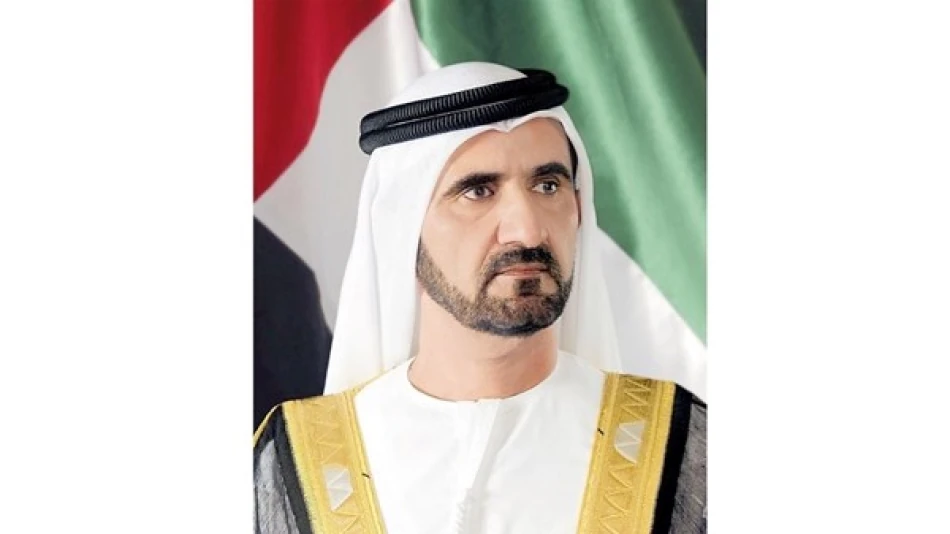
UAE Cabinet Reshuffle Announced by Sheikh Mohammed bin Rashid with President's Blessings
UAE Reshuffles Health Ministry Leadership as Healthcare Transformation Accelerates
The UAE has appointed Ahmed Al Sayegh as its new Health Minister, replacing Abdul Rahman Al Owais in a strategic cabinet reshuffle that signals the nation's commitment to advancing its federal healthcare system. The move comes as the Emirates positions itself as a regional healthcare hub while managing ongoing sector reforms that began during the COVID-19 pandemic.
Leadership Transition Reflects Healthcare Modernization Push
Sheikh Mohammed bin Rashid Al Maktoum, UAE Vice President, Prime Minister, and Ruler of Dubai, announced the ministerial change via social media, emphasizing continuity in the country's healthcare evolution. Al Owais, who oversaw significant healthcare system developments during his tenure, will transition to a new role as Minister of State for Federal National Council Affairs, ensuring his expertise remains within the government structure.
The appointment of Al Sayegh comes at a critical juncture for UAE healthcare policy. The country has been implementing comprehensive reforms to create a unified federal healthcare system, moving away from the previous emirate-by-emirate approach that sometimes created inefficiencies and coverage gaps.
Strategic Timing Amid Regional Healthcare Competition
This leadership change positions the UAE to compete more effectively with regional healthcare destinations like Saudi Arabia and Qatar, both of which have announced massive healthcare infrastructure investments as part of their economic diversification strategies. The UAE's healthcare sector has grown significantly, with medical tourism contributing an estimated $2.6 billion annually to the economy.
Building on Pandemic-Era Innovations
Al Owais's tenure was marked by the UAE's notably successful COVID-19 response, which included one of the world's fastest vaccination rollouts and innovative digital health initiatives. The country achieved a 99% vaccination rate among eligible populations and became a testing ground for multiple vaccine trials, enhancing its reputation as a healthcare innovation hub.
Under the previous leadership, the UAE also launched ambitious telemedicine programs and AI-driven diagnostic tools, setting the foundation for what Al Sayegh will likely expand upon. The country's investment in healthcare technology has attracted international partnerships with major pharmaceutical companies and medical device manufacturers.
Economic Implications for Healthcare Investment
From an investor perspective, this ministerial change suggests continued government commitment to healthcare sector growth. The UAE has allocated substantial budget increases for healthcare infrastructure, with plans to build new hospitals and expand existing facilities across all seven emirates.
The healthcare sector represents a key pillar of the UAE's economic diversification strategy, particularly as the country seeks to reduce its dependence on oil revenues. Medical tourism alone is projected to grow by 12% annually, making ministerial stability and vision crucial for maintaining investor confidence.
Federal Integration Challenges Ahead
Al Sayegh inherits the complex task of further integrating healthcare services across the emirates while maintaining the high standards already established in Dubai and Abu Dhabi. This includes standardizing medical protocols, creating unified electronic health records, and ensuring equitable healthcare access across urban and rural areas.
The new minister will also need to address healthcare workforce challenges, as the UAE relies heavily on expatriate medical professionals. Developing local talent while maintaining international expertise will be crucial for long-term sustainability.
This cabinet reshuffle demonstrates the UAE's pragmatic approach to governance, maintaining institutional knowledge while bringing fresh perspectives to key portfolios. As regional healthcare competition intensifies, the success of this transition will likely influence the Emirates' position as a medical destination and healthcare innovation center.
Most Viewed News

 Layla Al Mansoori
Layla Al Mansoori






